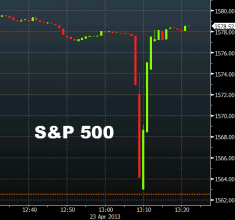This week, tick data management and analytics specialist OneMarketData published the results of a survey into the use of social media across investment and trading firms. The survey asked market participants on the buy-side and sell-side as well as academics in the financial field about their current use of social media for making trading and investment decisions, as well as their planned future use.
 The survey was carried out in the immediate aftermath of the ‘Hack Crash‘ of April 23, 2013, in which markets plummeted after a fake tweet from the Associated Press Twitter account stated that there had been an explosion at the White House. Billions were wiped off the value of stocks, only for the markets to recover strongly a few minutes later when the hoax was revealed. This was the clearest demonstration to date of the power that social media now wields over the capital markets – but also heightened concerns about the use of social media to feed trading strategies, particularly given the growing use of high frequency trading (HFT) strategies to make automated trades.
The survey was carried out in the immediate aftermath of the ‘Hack Crash‘ of April 23, 2013, in which markets plummeted after a fake tweet from the Associated Press Twitter account stated that there had been an explosion at the White House. Billions were wiped off the value of stocks, only for the markets to recover strongly a few minutes later when the hoax was revealed. This was the clearest demonstration to date of the power that social media now wields over the capital markets – but also heightened concerns about the use of social media to feed trading strategies, particularly given the growing use of high frequency trading (HFT) strategies to make automated trades.
Social media data has the potential to be one of the most useful data sources from a trading perspective, due to the sheer volume of information and the fact that it is generated in a completely democratic way, thereby potentially reflecting market sentiment and trends in a much more accurate way than any other type of data set. However, these benefits also create big problems in terms of the accurate analysis of this data.
To this end, a number of innovative solutions have emerged to transform social media data into tradable signals. One of the leading lights in this field has been DataMinr, a new service which processes around 400 million tweets on a daily basis and filters them into market and sector-specific data feeds to identify the most credible and newsworthy tweets, and provide actionable market signials.
 This service has been attracting a lot of attention from within the industry, and has recently obtained $30m in venture capital funding. One of its most notable successes to date has been in alerting its users that the aforementioned AP tweet was most likely fake before the market sell-off had ended. This shows the potential for technological solutions to overcome the problems inherent in leveraging a large scale, fully democratized medium such as Twitter to find useful trading information. However, implementing solutions such as this require significant investment, and at present, not all market participants are convinced that it is worthwhile, although there are indications that this may change in the years to come.
This service has been attracting a lot of attention from within the industry, and has recently obtained $30m in venture capital funding. One of its most notable successes to date has been in alerting its users that the aforementioned AP tweet was most likely fake before the market sell-off had ended. This shows the potential for technological solutions to overcome the problems inherent in leveraging a large scale, fully democratized medium such as Twitter to find useful trading information. However, implementing solutions such as this require significant investment, and at present, not all market participants are convinced that it is worthwhile, although there are indications that this may change in the years to come.
More than half of those surveyed said they were convinced that social media data provides the opportunities to capture alpha on a daily basis, but just 18% said that they were currently employing it for this purpose. Another 35% said that they were currently in a process of researching ways to utilise social media data in their trading activities, which suggests that this is a field that will see significant growth going forward.
Naturally, some asset classes are more suited to this type of analysis than others. More than half of those surveyed said that equity traders had the most to gain by leveraging social media data, with 30% stating that futures and options traders would find it most useful. Of the asset classes that survey respondents felt were the least well suited to the incorporation of social media data, fixed income trading came out on top with 43%, with forex trading not far behind on 29%.
The potential value of social media in terms of the analysis of historical trends and near real-time analysis appears to be beyond doubt, with 75% of those surveyed agreeing that social media could be used to improve these. However, 46% said that their firms would not be using, or investing in the use, of social media in 2013. The reliability of the information that can be gleaned from social media seems to be the biggest obstacle to its widespread adoption, with 62% expressing concerns about the potential for false positive signals.

In a statement issued at the launch of the survey results, OneMarketData’s director of solutions Louis Lovas said: “We’re in the middle of an important change in the way social media is being viewed by financial market participants…While there is still quite a bit of skepticism in the industry around the credibility of social media as a source to generate alpha, interest is rapidly growing as both regulators and market participants have signaled they are paying attention to the medium. As social media data continues to gain validation in the industry, demand for solutions that can harness the power and reduce the risk of this new data source will also grow. As we hit that point, our view is that social media will prove to upend the way market participants use information to trigger trading and investment decisions.”
The findings of the survey were echoed by an investigation by Deutsche Bank into social media, said Lovas. “The head of quantitative strategy presented some findings at a Chicago trading show, and his results correlated what OneMarketData is finding: Social media impacts markets, yet the content of the news is less important than the volume of the news. This means the number of mentions is more influential than if the sentiment is good or bad.”
So, while it is clear that the market is taking social media increasingly seriously, it is also evident that there is a lot of reluctance among market participants to prioritize it at the time of writing. Because the technologies used to leverage this data are still at an early stage of evolution, it will probably take a bit of time before it is fully accepted as a usable technology by mainstream market participants. However, those that are using it – and this is a significant and growing number – clearly feel that the early adoption of these technologies will give them an edge, and if nothing else, it will place them in a stronger position in terms of experience and expertise as the technology matures.
The full questionnaire can be viewed here.
Tradersdna is a leading digital and social media platform for traders and investors. Tradersdna offers premiere resources for trading and investing education, digital resources for personal finance, market analysis and free trading guides. More about TradersDNA Features: What Does It Take to Become an Aggressive Trader? | Everything You Need to Know About White Label Trading Software | Advantages of Automated Forex Trading



































